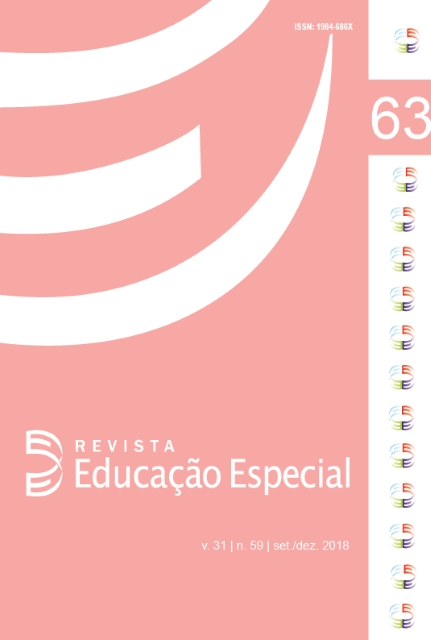Avaliação dos estudantes público alvo da educação especial: perspectiva dos professores especializados
DOI:
https://doi.org/10.5902/1984686X33082Palavras-chave:
Educação Especial, inclusão escolar, avaliação educacionalResumo
O presente relato apresenta os resultados de um estudo realizado com professores do atendimento educacional especializado que atuavam em salas de recursos multifuncionais. Participaram sete professores da rede municipal de um município paulista, de médio porte, que contabilizava 1.314 matrículas de alunos com necessidades educacionais especiais, e foi baseada em entrevistas com grupos focais realizadas durante dois encontros. Todos os encontros foram videogravados, e posteriormente as falas foram transcritas e analisadas usando-se o software Atlas-ti. O corpus do estudo foi composto por 240 excertos nas narrativas dos professores, classificadas em 165 códigos e 16 famílias. Os resultados foram organizados nos seguintes temas: a) O Processo de avaliação para identificação; b) A questão do diagnóstico clínico, c) Avaliação para planejamento, d) Plano de atendimento, e) Avaliação do desempenho no atendimento educacional individualizado, f) Avaliação do rendimento acadêmico na classe comum, g) Retenção/promoção de nível ou série, h) Participação dos alunos em avaliações padronizadas de larga escala. No conjunto as evidencias permitem concluir que coexistem uma variedade de processos de avaliação, o que indica a falta de diretrizes mais claras para as escolas e professores. Observou-se fragilidades nos processos de avaliação para identificação, negligencia em relação aos processos de avaliação tanto para planejamento quanto do desempenho, o que parece indicar que ainda estamos longe de garantir mais do que a presença, mas a efetivação do direito à educação dos alunos do público alvo da Educação Especial nas escolas brasileiras.Downloads
Referências
BASTOS, M. G. A. Diagnóstico das necessidades educacionais especiais: evolução e novas tendências. In: MAGALHÃES, R. P. et al. (Org.). Reflexões sobre a diferença. Fortaleza: Edições Demócrito Rocha, p.92-101, 2002.
BRASIL. Constituição da República Federativa do Brasil. Brasília, DF, 1988.
BRASIL. Ministério da Educação. Decreto nº 6.571 de 18 de setembro de 2008 que instituiu as Diretrizes Operacionais para a Educação Especial. Brasília, SEESP, 2009.
BRASIL. Ministério da Educação. Diretrizes nacionais para a educação especial na educação básica. Secretaria de Educação Especial. MEC/SEESO, 2001. 72 p.
BRASIL. Ministério da Educação. Instituto Nacional de Estudos e Pesquisas Educacionais - INEP. Sinopses estatísticas da educação básica/censo escolar.Brasília: MEC/INEP, 2013.
BRASIL. Ministério da Educação. Lei de Diretrizes e Bases da Educação Nacional –Lei n.º 9.394/96, de 20 de dezembro de 1996. Brasília: MEC, 1996.
BRASIL. Ministério da Educação. Secretaria de Educação Especial. Diretrizes nacionais para a Educação Especial na Educação Básica. Brasília: SEESP, 2001.
BRASIL. Saberes e práticas da inclusão: avaliação para identificação das necessidades educacionais especiais. [2. ed.] / coordenação geral SEESP/MEC.- Brasília: MEC, Secretaria de Educação Especial, 2006. 92 p. (Séri : Saberes e práticas da inclusão).
CAMPOS, T. M.; OLIVEIRA A. A. S. Avaliação em Educação Especial: o ponto de vista do professor de alunos com deficiência. Estudos em Avaliação Educacional, 16(31), 28, 2005.
CAPELLINI, V. L. M. F. A avaliação das possibilidades do trabalho colaborativo no processo de inclusão escolar do aluno com deficiência mental. 2004. 299 f. Tese (Doutorado em Educação Especial), UFSCar, São Carlos, 2004.
MENDES, E.G CIA, F.; D´AFFONSECA, S. M. (Org.. (2015) Inclusão Escolar e a avaliação do Público-alvo da Educação Especial. 1. ed. São Carlos: Observatório nacional de educação especial. v. 2. 522p
MENDES, E.G.; LOURENCO, G.F. Viés de gênero na notificação de alunos com necessidades educacionais especiais. Rev. bras. educ. espec. [online]. 2009, vol.15, n.3 [cited 2018-06-01], pp.417-430. Available from: <http://www.scielo.br/scielo.php?script=sci_arttext&pid=S1413-65382009000300006&lng=en&nrm=iso>. ISSN 1413-6538. (2009).
MENDES, E. G.; VILARONGA, C. A. R.; ZERBATO, A. P. Ensino colaborativo como apoio à inclusão escolar: unindo esforços entre educação comum e especial. São Carlos: UFSCar, 2014.OLIVEIRA, A.A.S.; CAMPOS, T.E.PINHEIRO Avaliação em educação especial: o ponto de vista do professor de alunos com deficiências. Estudos em avaliação educacional¸v.16, n.31, jan/jun 2005. (pp.51-78)
MENDES, E.G. Breve histórico da Educação Especial no Brasil. Revista Educación y Pedagogía, v. 22, p. 93-110, 2010.
OMOTE, Sadao. Inclusão: da intenção à realidade. In: OMOTE, Sadao (Org.). Inclusão: intenção e realidade. Marília: Fundepe, 2004. p. 1-9
PINHEIRO, R.A. A Pesquisa Colaborativa e a Formação de Professores Reflexivos na EJA: Formação docente em contextos de mudanças. 2012.
RODRIGUES, O.M.P.; MARANHE, E. A. Educação especial: história, etiologia, conceitos e legislação vigente.In: Práticas em educação especial e inclusiva na área da deficiência mental / Vera Lúcia Messias Fialho Capellini (org.). – Bauru: MEC/FC/SEE, 2008. 12 v. il.
SALVIA, JOHN; YSSELDYK, JAMES E. & BOLT, SARA. Assessment in Special and Inclusive Education. Wadsworth, Cengage Learning, 2010
SILVA, M.C.V.; MELETTI, S.M.F. Estudantes com Necessidades Educacionais Especiais nas Avaliações em Larga Escala: Prova Brasil e ENEM. Revista Brasileira de Educação Especial. v. 20, n. 1, p. 53-68, 2014
Downloads
Publicado
Como Citar
Edição
Seção
Licença

This work is licensed under a Creative Commons Attribution-NonCommercial 4.0 International (CC BY-NC 4.0)
DECLARAÇÃO DE ORIGINALIDADE E DIREITOS AUTORAIS
Declaramos o artigo a ser submetido para avaliação na Revista Educação Especial (UFSM) é original e inédito, assim como não foi enviado para qualquer outra publicação, como um todo ou uma fração.
Também reconhecemos que a submissão dos originais à Revista Educação Especial (UFSM) implica na transferência de direitos autorais para publicação digital na revista. Em caso de incumprimento, o infrator receberá sanções e penalidades previstas pela Lei Brasileira de Proteção de Direitos Autorais (n. 9610, de 19/02/98).







